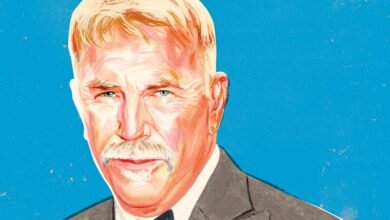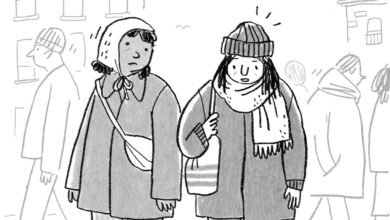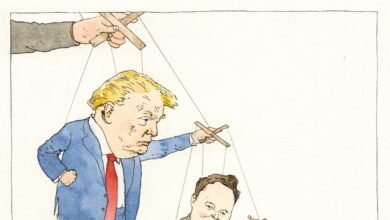A Tattoo Homage to Norma Desmond

The British theatre director Jamie Lloyd got his first tattoo eleven years ago, when he was in Los Angeles workshopping a new musical. He missed his two small sons, George and Lewin, so he got their names inked on his left forearm. When his third son, Jack, was born, he returned to L.A. and added him. Now he’s tattooed all over: the top of his head (the Japanese Buddhist deity Fudo Myo-o), the front of his neck (two skulls, one smiling and one scowling, like the comedy and tragedy masks), his fingers (spectral flames), above his right eyebrow (the word “silence,” an ode to the power of stillness and to the pregnant pauses of Harold Pinter).
Lloyd, who was born in a seaside town on England’s southern coast, started his tattoo habit relatively late in life. “My father had tattoos on his arms. He was a truck driver,” he recalled recently. “I remember always being slightly embarrassed of my dad’s tattoos for some reason. At my graduation, I said to him, ‘Wear long sleeves.’ Times have changed.” Lloyd, a punky forty-three-year-old, is unlike the stereotype of the gentlemanly London stage director, and his stripped-down, cold-blooded versions of the classics—Ibsen’s “A Doll’s House,” starring Jessica Chastain; Pinter’s “Betrayal,” with Tom Hiddleston—have electrified the West End and Broadway. His latest import: a bloody, minimalist take on the Andrew Lloyd Webber musical “Sunset Boulevard,” starring Nicole Scherzinger as the murderous silent-movie queen Norma Desmond.
Before a rehearsal one morning, Lloyd stopped at a building in the financial district to add one more tat to his ensemble: “10086,” the address of Norma’s mansion on Sunset Boulevard. “Something amazing about a tattoo is the way it ages,” he said. “It always looks better when it’s settled into the skin.” In that sense, a fresh tattoo was not unlike a show settling into previews, and “Sunset Boulevard” had just played its first two. Lloyd took an elevator up to a “wellness floor,” which had a coffee bar and sleek offices for acupuncturists and nail technicians. There he met Keith (Dez) Hernandez, a tattoo artist he’d discovered on Instagram, whose studio was decorated with graffiti canvases and overlooked the East River. “This is, like, the nicest tattoo studio ever,” he said.
Dez, a Bronx native (his father, a Mets fan, named him after the famous first baseman), looked over Lloyd’s illustrated body. “You have space?” he asked. “You’re more tatted than I am!” Lloyd had two potential spots for “10086”: behind his right ear or above his right collarbone. He wanted the number in an Old English-style font. Dez’s studio manager, who goes by Paz, pulled up options on a laptop, and they chose one called Victorian Text. Pointing to the deity on Lloyd’s cranium, Dez asked, “How painful was that?”
“Not so bad,” Lloyd said. “The fingers were the worst.”
Dez said that he got his first professional tat at eighteen and started tattooing others about a decade ago, out of his apartment in the Bronx. He’d recently done a house call for Jalen Brunson, the point guard for the Knicks. “I actually like the theatre,” he told Lloyd. “I’ve gone to—whaddayacallit?—‘Jersey Boys’ a few times.” He was amazed by how Broadway performers have to be “perfect every time.” Another parallel with tattooing? “Well, when you mess up you just make it look like it’s perfect,” he said. The two men bonded over the assumptions that people make about them because of their tattoos. “I’m staying in the East Village, and this guy came up to me the other night, convinced that he knew me from prison,” Lloyd said.
Paz printed out a stencil for the number, and Dez affixed it to each potential spot. He advocated for behind the ear. “It looks like it was meant to be there,” he said. Lloyd trusted him—he sees tattooing as a collaboration, akin to how he works with actors: “I basically give them a level of freedom to do what they want to do.” (Next fall, he’s directing “Waiting for Godot” on Broadway, starring Alex Winter and Keanu Reeves, a.k.a. Bill and Ted.)
“I’m ready, bro. Let’s get it!” Dez said. Lloyd lay on his side on a foldout table, and Dez got to work with a buzzing tattoo pen. Despite the sting, Lloyd felt his eyelids droop. “It’s kind of nice to have a little rest,” he said. “I’ve been so busy.” After twenty-five minutes, Dez showed him his newest tat in a mirror and said, “I like it there, brother.”
“Yeah, it’s cool!” Lloyd said, beaming. He invited Dez to come see “Sunset Boulevard,” then went to catch a car uptown to rehearsal. Would Norma Desmond ever get a tattoo? Probably not, Lloyd reasoned, “unless it was her own portrait.” Then he reconsidered: “Or her eyes. One of my favorite moments is when she says, ‘I can say anything I want with my eyes.’ ” ♦




